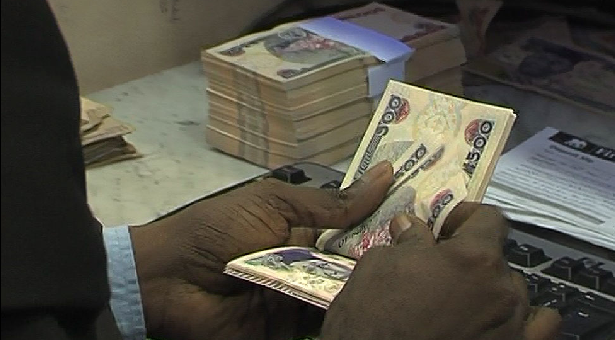As agents of the Economic and Financial Crimes Commission (EFCC), Independent Corrupt Practices and Other Related Offences Commission (ICPC), and Department of State Security (DSS) have been storming commercial banks and picking up senior bank officials hoarding the redesigned naira notes, those culpable may not have realised the extent of trouble they are enmeshed in.
Aside arresting defaulting banks, the agencies have also been arresting other individuals who deal in selling the naira notes.
In some parts of Nigeria including Abuja, Osogbo, Ekiti among others, law enforcement agents have apprehended senior officials of commercial banks for failing to load their Automated Teller Machines (ATMs) with the new currency, thus fueling chaos and crisis in the nation’s financial system.
Investors King had reported how EFCC agents arrested the bank manager of a commercial bank in the Federal Capital Territory (FCT) for hoarding N29 million new notes.
Meanwhile, even as the operatives intensify their round-up exercise in order to restore sanity to the financial institutions, it has been revealed that those arrested may be at the risk of paying the sum of N5 million as fine.
As contained in the Central Bank of Nigeria Act of 2007 and the Banks and other Financial Institutions Act of 2020, banks hoarding notes should be punished by the apex bank through payment of N5m fine while members of the public transacting the new notes risk N50,000 fine.
If any official working with a particular bank is caught hoarding the currency, the Act says such worker is liable to a fine of at least N5m which the bank would pay and an extra N100,000 for each day of the compliance failure.
According to the Act, the Governor of CBN has the right to alter, amend or propose new fines as contained in Section 5(4,5) of the Act.
It further revealed that where the governor proposes to vary, revoke or impose fresh or additional conditions on a licence, the Governor shall, before exercising such power, make notice of his intention known to the bank affected and give the bank an opportunity to make representation to him thereon.
After this is done, any bank that fails to comply with any fresh or additional condition imposed in relation to its licence is liable to (a) a penalty of not less than N5,000,000, and (b) an additional penalty of N100,000 for each day during which the fresh or additional condition is not complied with.
The punishments for defaulters are not limited to fine, imprisonment is also involved in a case where the convict could not meet the fine.
In the midst of the crisis, the Act states that even though some officials might escape being arrested, but any bank director, manager or officer who fails to ensure that compliance is observed is also guilty and is liable to at least three years imprisonment, or N2m, or both.
It was further discovered that Section 5(6) of the Act states that any person who, being a director, manager or officer of a bank fails to take reasonable steps to secure compliance with any of the conditions of the licence of the bank commits an offence and is liable on conviction to imprisonment for a term of not less than three years or a fine of not less than N2,000,000 or both.
For those who have been found hawking and trading the Nigeria around commercial banks and elsewhere, they are liable to six months imprisonment or a fine of at least N50,000, according to the CBN Act 2007.
The could be recalled that the CBN had earlier threatened to prosecute anyone caught selling or abusing the Naira.
To this end, security agents have been raiding the banks and picking up those who flout the directives.
Also, officials of the apex bank have been going around the country and monitoring compliance level of commercial banks with discoveries of cash hoarding in some banks.
The CBN Director of Corporate Communications, Osita Nwanisobi, had expressed worry over the hoarding and selling of the new notes, and promised to work with security agencies to tackle the menace.

 News3 weeks ago
News3 weeks ago
 Business3 weeks ago
Business3 weeks ago
 Technology3 weeks ago
Technology3 weeks ago
 Investment3 weeks ago
Investment3 weeks ago
 Banking Sector3 weeks ago
Banking Sector3 weeks ago
 Banking Sector3 weeks ago
Banking Sector3 weeks ago
 Appointments3 weeks ago
Appointments3 weeks ago
 Investment3 weeks ago
Investment3 weeks ago


























